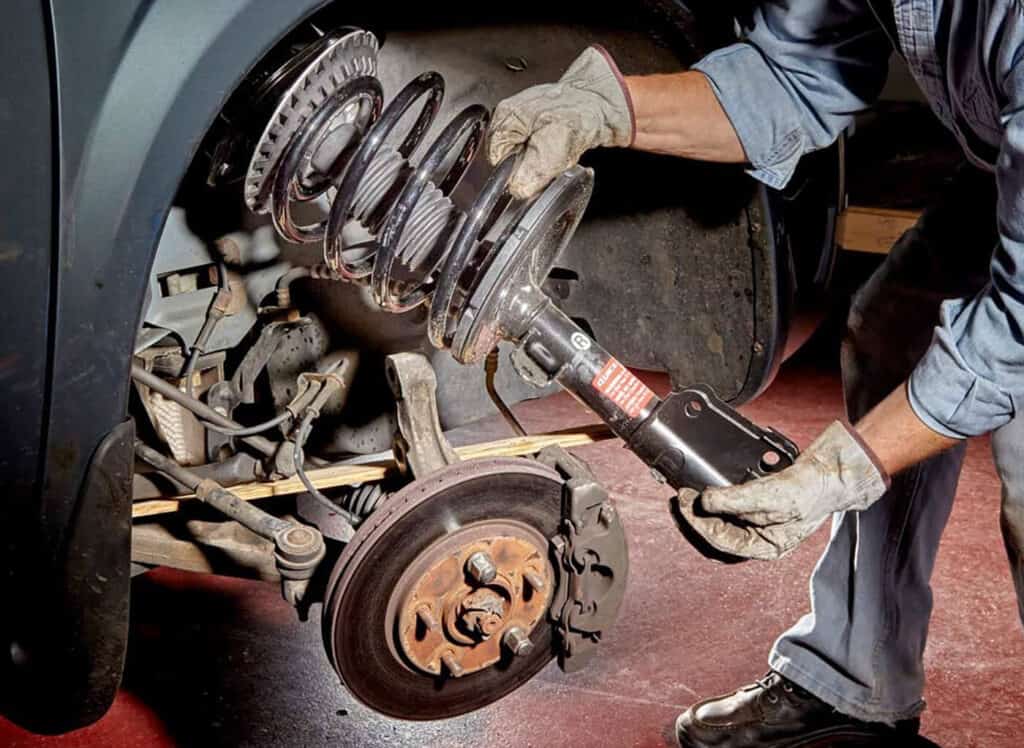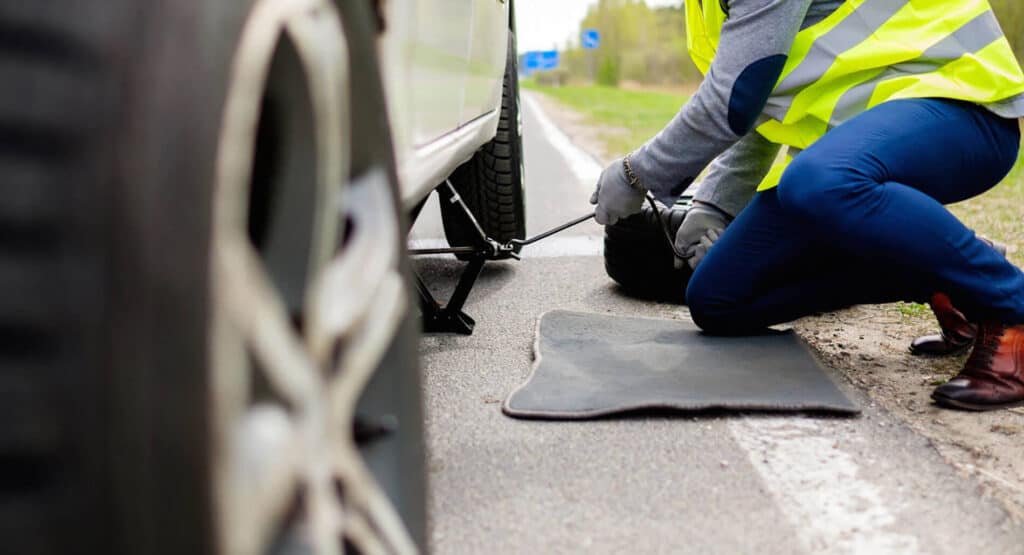The Crossroads of Convenience — Understanding Your Options for Shock Absorber and Struts Replacement
Remember the days when the only way to replace your car’s shock absorbers and struts was to book an appointment with a traditional mechanic and wait in a grimy lounge for your turn? Times have changed. In the evolving landscape of auto repair, you now have choices, including mobile mechanics who bring the shop to you. But which option is best for your vehicle’s suspension system? Let’s delve in.
The Mobile Mechanic: Advantages and Limitations
In the age where everything from grocery shopping to medical consultations can be done at your doorstep, why should auto repair lag behind? Mobile mechanics offer a contemporary twist on traditional vehicle repair services. Let’s unpack the advantages and limitations of this emerging choice.
Advantages
Convenience: The term “mobile” really means it; these mechanics bring the repair shop to you. Gone are the days of sitting in a waiting room thumbing through old magazines while your vehicle gets serviced. With mobile mechanics, you can continue with your everyday activities at home or work while your car is being repaired. Convenience, in this sense, isn’t just a luxury—it’s a game-changer for those with tight schedules or limited mobility.
Personalized Service: Ever felt like just a number at a traditional mechanic shop? Mobile mechanics usually offer a different experience. The one-on-one interaction provides an opportunity for a more personalized service. You can ask questions, get immediate feedback, and even pick up a few maintenance tips. The mechanic has the time to explain to you the intricacies of the repair job, which can be a valuable educational experience for non-expert car owners.

Limitations
Limited Machinery: The notion of a mobile mechanic sounds liberating, but there are physical limitations to consider. Mobile units are typically well-stocked for basic to moderately complex tasks, but when it comes to highly specialized or intricate repairs that require heavy-duty machinery, they may fall short. Think of it as having a toolbox versus a full-fledged workshop. For most tasks, a toolbox will suffice, but for some, you’ll need the depth and range of tools only a workshop can offer.
Workspace Limitations: Your driveway or parking space becomes the de facto garage for the repair work. However, some residential or commercial areas might have restrictions against such activities. Local bylaws or homeowner association rules may prohibit automotive repairs in certain types of public or residential areas. In these cases, you may have to seek alternate locations, which might cut into the convenience factor.
Mobile mechanics offer a compelling mix of advantages primarily centered around convenience and personalized service. However, limitations warrant consideration. The trick is to evaluate your specific needs, the complexity of the repair job, and the rules of the location where you’ll have the service done. With this information in hand, you can make an informed decision that best suits your circumstances.
The Traditional Mechanic Shop: Why It’s Still a Viable Choice
In the realm of auto repair, traditional mechanic shops are akin to established universities: well-equipped, specialized, and possessing a wealth of collective experience. One of the primary strengths of a brick-and-mortar shop is the availability of specialized services. These establishments often have the necessary heavy-duty machinery and specialized tools that enable them to handle a diverse range of repairs, from basic oil changes to intricate suspension overhauls. In other words, if your car needs a specific type of care, a traditional mechanic shop is likely equipped to provide it. This is particularly beneficial for complex tasks that require specialized expertise, which a mobile mechanic might not be able to handle.
Another noteworthy advantage is the capacity for comprehensive inspections. A traditional mechanic shop typically has a full suite of diagnostic equipment and tools that enable in-depth evaluations of your vehicle’s condition. If you’re hearing a peculiar noise or notice your car isn’t handling as it should, these shops can run a battery of tests to pinpoint the issue accurately. This holistic approach to vehicle health can unearth problems you might not have even been aware of, providing an opportunity to address multiple issues in a single visit. The breadth and depth of inspections that a traditional shop can offer set the stage for a thorough, more complete servicing of your vehicle.
Logistical Challenges: Comparing the Feasibility of Replacing Shocks and Struts On-Site vs In-Shop
• Expertise Required: Both mobile mechanics and traditional shops need a specific skill set to tackle shocks and struts replacement. It involves understanding both the mechanical and safety aspects, including how to properly lift the vehicle, remove old components, and install new ones.
• Tool Availability: Mobile mechanics usually bring a variety of tools to handle most common repairs, including shock and strut replacement. However, traditional mechanic shops often have a wider array of specialized tools that might be better suited for certain models or complex situations.
• Workspace: Traditional shops are designed to accommodate multiple types of repairs, often simultaneously. Mobile mechanics, while incredibly versatile, might face limitations if the repair needs to take place in a restricted or difficult area like a busy street or a cramped garage.
• Inspection Capability: A traditional shop might have advanced diagnostic tools and the capability to perform more comprehensive inspections. This could potentially unveil other issues that might be overlooked by a mobile mechanic using basic diagnostic tools.
• Weather Conditions: One often-overlooked aspect is weather. Mobile mechanics may be at the mercy of Mother Nature. Rain, extreme heat, or cold can complicate the replacement process. Traditional shops offer a controlled environment that’s unaffected by weather conditions.
• Safety Protocols: While both types of mechanics adhere to safety standards, traditional shops may have additional safety measures in place, such as multiple lifts and support staff, which might make the process more secure.
• Scheduling Flexibility: Mobile mechanics often provide more flexible scheduling, including emergency services, which might make them more feasible for urgent replacements. Traditional shops usually work on an appointment basis and may not have immediate availability.
• Permit Requirements: Some local laws and community rules may restrict the types of repairs that can be done in public or residential areas, which could limit a mobile mechanic’s feasibility for certain jobs. Traditional shops don’t face these restrictions.
• Job Duration: Due to the specialized tools and additional hands usually available in a traditional shop, some jobs may be completed more quickly, although this can come at a higher labor cost.
• Cleanup and Waste Disposal: Traditional shops are set up to properly dispose of any waste products, such as old parts or fluids. While many mobile mechanics are trained to do this as well, a traditional shop might have more robust procedures for eco-friendly disposal.
Cost Comparison: The Economic Implications of Your Choice
Initial Costs: Mobile mechanics usually have lower overhead, which can result in a more budget-friendly initial quote. Traditional shops often have higher operating costs that may be passed on to the customer.
Hidden Fees: Mobile mechanics might charge extra for services like emergency calls or additional parts, which aren’t always included in the initial estimate.
Quality of Parts: Traditional shops might offer different tiers of part quality, from generic to brand-name, allowing for some control over costs. Mobile mechanics might have fewer options on hand, potentially affecting the price.
Package Deals: Some traditional shops offer package deals for multiple services, which might end up being cost-effective if you need more than just your shocks and struts replaced.
Transparency: Many traditional shops offer detailed invoices breaking down labor and parts costs. Mobile mechanics can offer this too, but make sure to ask upfront to avoid surprises.
Travel Costs: Using a mobile mechanic eliminates the need to travel to a shop, saving you both time and fuel costs. However, some might charge a fee for long-distance travel.
Payment Options: Traditional shops often have financing options or partnerships with credit companies, offering you some flexibility in payment. This may not always be the case with mobile mechanics.

Quality of Parts: Do You Have a Say?
When it comes to the quality of parts used in your vehicle, many people assume that traditional mechanic shops have a broader range or higher quality options than mobile mechanics. But that’s not necessarily the case. Both avenues typically offer a selection of part quality, from aftermarket to OEM (Original Equipment Manufacturer), that you can choose from. This flexibility allows you to strike a balance between cost and durability, regardless of whether you opt for a mobile mechanic or a brick-and-mortar shop. So yes, you do have a say in the matter, and it’s a choice that can affect both the longevity and performance of your newly replaced shocks and struts.
Common Questions and Misconceptions: Clearing the Air
Can Mobile Mechanics Do a Comprehensive Job?: Absolutely. Most mobile mechanics come well-equipped with the necessary tools and expertise to replace shock absorbers and struts efficiently. While they might not have every specialized piece of equipment a traditional shop has, they can certainly handle the basics and more.
Is a Traditional Shop Always More Expensive?: This is a common misconception. The total cost can vary significantly and depend on several factors like labor rates, the quality of parts chosen, and any additional services you might need.
Is On-Site Repair Less Reliable?: Not at all. Mobile mechanics are trained professionals, often with the same credentials as those working in traditional shops. The quality of the repair generally depends more on the skill of the mechanic than the location of the service.
Do I Have to Provide My Own Parts?: Whether you’re working with a traditional shop or a mobile mechanic, the service generally includes the cost of parts unless you opt to provide your own.
What About Guarantees and Warranties?: Both mobile mechanics and traditional shops usually offer some form of warranty on their work and the parts used. Always check the terms before proceeding with any service.
Can Mobile Mechanics Handle Emergency Repairs?: Many mobile mechanics offer emergency services, though it’s advisable to confirm this in advance. Traditional shops usually operate on fixed schedules and may not be available for immediate, unscheduled repairs.
Is DIY a Cheaper Alternative?: While doing it yourself might seem like a cost-saving strategy, incorrect installation can lead to further issues and more expenses down the line. Both traditional and mobile mechanics bring expertise that typically results in a more reliable, longer-lasting repair.
The Road Ahead — Making an Informed Decision for Your Vehicle’s Health
Navigating the road of vehicle maintenance has never offered more routes. Whether you prefer the personalized, convenient service of a mobile mechanic or the comprehensive approach of a traditional shop, the key is to understand your specific needs and circumstances. Either way, if you’re in Canada and looking for a solution that combines quality with convenience, consider booking an appointment with Uchanics for your shock absorber and strut replacement needs. The right choice today could mean a smoother, safer ride tomorrow.
